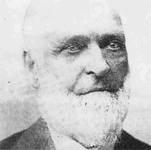The Legacy of Hezekiah Bradley Smith
 Our tale begins in the fall of 1865, in the run-down village of Shrevesville, in Burlington County. Once a thriving and successful community, the village had declined due to a depression in the textile market. On the brink of collapse, Shrevesville needed someone with an intelligent and hopeful mind to revive it. Fortunately for Shrevesville, the visiting Hezekiah Bradley Smith was the best man for the job. At the time, he was accompanied by his second wife, Agnes, and they both noticed that Shrevesville offered them the opportunity to build the community they had dreamed of.
Our tale begins in the fall of 1865, in the run-down village of Shrevesville, in Burlington County. Once a thriving and successful community, the village had declined due to a depression in the textile market. On the brink of collapse, Shrevesville needed someone with an intelligent and hopeful mind to revive it. Fortunately for Shrevesville, the visiting Hezekiah Bradley Smith was the best man for the job. At the time, he was accompanied by his second wife, Agnes, and they both noticed that Shrevesville offered them the opportunity to build the community they had dreamed of. Smith was born in Bridgewater, Vermont on July 24, 1816. He spent his childhood on a farm in Woodstock, where he assisted his father at the tannery he operated. After completing an eighth-grade education, he was trained as a cabinet maker and set up a shop in his father’s former tannery building. Smith left Woodstock in 1846, taking with him a woman named Eveline Verona English, whom he married in May of 1846.
Hezekiah and Eveline moved to Manchester, New Hampshire, where he took a job as a machinist. However, a year after his arrival, Hezekiah opened up his own machine shop in Lowell, New Jersey. Instead of going with him, his wife moved back home to Vermont. No one is sure why they parted ways, but it is known that their separation was mutual. Although they would never live together again, Smith would often write to her, and he visited her frequently enough to produce three children: Elton, Eugene and Edward. He also made sure to provide monetary support for them.
In 1854, Smith met a young woman named Agnes Mitilda Gilkerson. Smith hired her as his personal secretary and supported her as she attended Penn Medical School, where she graduated in 1861 with a degree in medicine. Agnes eventually moved in with Hezekiah and began to sell medicine in town. By 1865, Smith's machinist company had outgrown its Lowell workshop, and he had to further expand by moving.
By this time, Hezekiah's long distance relationship with his wife Eveline had deteriorated. Smith made one last journey to Woodstock, where he legally disowned his entire family. Smith and Gilkerson got married that same year and moved to desolated town of Shrevesville. There, Smith continued his business, while his new wife sold her medicine. By 1869, the village, now known as “Smithtown,” had been rehabilitated and had become a major manufacturer of woodworking machinery.
In 1878, the highly popular Hezekiah Smith was nominated by the Democratic Party to run for the United States Congress. He campaigned as a representative of the second district of New Jersey. Smith won quite effortlessly and proved to be a talented congressional representative. Unfortunately, in the few years that followed, Agnes was diagnosed with cancer and died at the untimely age of 43. After her death, a heartbroken Smith commissioned a statue in her likeness and erected in their mansion at Smithtown.
In the 1880s, Hezekiah was approaching 70 and his behavior was becoming more unconventional. Although he still oversaw the village and involved himself in politics, he also began to collect wild animals for his private zoo. He also invited six young women to live at the mansion, and gossip circulated that they were servants. His health continued to deteriorate, and in 1887, the eccentric and brilliant Hezekiah Bradley Smith died of pneumonia at the age of 71.
Smith was buried next to his second wife in Mount Holly. However, the story does not end there. Hezekiah's oldest son, Elton, visited the grave in an attempt to remove his father's remains. In an act of redemption, he wanted the body transported to Woodstock to be buried next to his recently deceased mother. However, the clever Hezekiah had anticipated this, and had been buried in an iron coffin that had been set in concrete. Furious, Elton had the statue of Agnes destroyed, broken into pieces, and scattered through the town.
After Smith’s death, the village began a slow decline due to ineffective supervision and the changing economy. By the end of the 1930s, Smithville had returned to its weak, dilapidated self. It seemed as if Hezekiah’s work had all been for nothing, until 1975, when Burlington County purchased the village as the site for a county park. The memorable Hezekiah still resides in Mount Holly, despite the vengeful efforts of his renounced son.
© SouthJersey.com 2015. All rights reserved. This article or parts thereof may not be reprinted or reproduced by any other party without the express written consent of SouthJersey.com. For more information, please call 856-797-9910.
For more South Jersey History, visit our South Jersey History page.
advertisement

Author: Max Cohler
Archives
A TALE OF THREE WEDDINGS
Timber Creek’s Leary heads to Illinois
One of Us
The Weekender
Hometown Flavor
Hoop Dreams
Symon Says
Food & Drink: Raise a Glass
Off the Ice
Rewarding Work
Dig This
The Berlin Cemetery
A Southern Mansion
Fire on the Morro Castle
Pine Barrens Fire of 1936
More...







